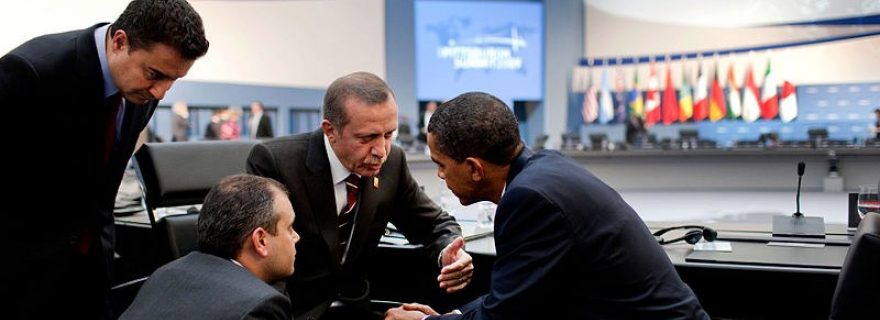"Treason": A Historical Perspective on Emerging Opposition against Erdoğan
Erdoğan's former ministers have founded new opposition parties. What do their stories tell us about Turkey’s political culture?
As Turkey is trying to fight against the COVID-19 pandemic and the Erdoğan administration continues their crackdown on the opposition and the media, a new type of opposition has emerged against Erdoğan. Two new political parties were founded: the Future Party (Gelecek Partisi) and the Democracy and Progress Party (DEVA, Demokrasi ve Atılım Partisi, whose acronym reads as “cure”). How this opposition emerged and what kind of a treatment they receive from the government and their media tell us something about the continued practice of vilifying the opposition as “traitors” in the political culture of Turkey.
What separates these new parties from other oppositional parties is that their leaders served as high-ranking ministers in the cabinets of Erdoğan’s AKP (Justice and Development Party). The Future Party’s leader Ahmet Davutoğlu is a professor of political science and international relations, and was a member of parliament between 2011 and 2018. Between 2009 and 2016, he served as foreign minister, chief advisor of Erdoğan, and finally as prime minister, until he was forced to resign in 2016. The founder of the Democracy and Progress Party, Ali Babacan, served during all four Erdoğan administrations (2002-2018) either as minister or as member of parliament. In addition, he was one of the founders of the AKP, the chief negotiator during Turkey's accession process to the European Union, and the minister of economy during the years of economic boom in the mid-2000s.
Both Davutoğlu and Babacan resigned from the AKP as a result of fundamental disagreements with President Erdoğan. Davutoğlu had earlier clashed with Erdoğan on topics ranging from foreign policy to the criminalising of academics that signed a petition. He was finally ousted in 2016. Internal power struggles and Erdoğan’s desire to become a one-man-show seem to have played role in Davutoğlu's resignation. As for Babacan, although he had long lost his prominence, he continued to be a member of the AKP until he resigned in 2019. He later stated in a TV broadcast that the party had moved away from its foundational values, such as transparency, rule of law, and democracy.
After the opposition parties emerged, Erdoğan’s circles did not waste time to target them with slurs and defamations. Already before his resignation, Davutoğlu had been the target of a vicious slander campaign (a.k.a. Pelican Files) by hard-line Erdoğanists. While Erdoğan himself carefully ignores both parties and leaders – not even mentioning their names – it is the pro-government media and state institutions that seem to have been charged with intimidating them.
Shortly after Davutoğlu announced his new party, financial measures, which seem to have been politically motivated, were implemented against a foundation established by himself (the Foundation for Arts and Sciences) and a private university (Istanbul Şehir University). The foundation was confiscated through government appointed trustees, and the university later had to be shut down.
As for Babacan, during a live broadcast that was viewed by many people, he said that the first thing he would do if he came to power would be to release prisoners of conscience. Shortly after, Erdoğan's Presidential Communications Director, Fahrettin Altun, targeted Babacan on Twitter. He released a flood of tweets using the words “coup-plotter” and “terror” multiple times – without actually naming Babacan – and stressed that the aforementioned crimes could not be justified by freedom of speech.
Both the emergence of this opposition and the way they are treated by Erdoğan’s circles are a recurring theme in the political history of Turkey. Already before the establishment of the parties, Erdoğan had anonymously warned his followers of attempts of “treason” and “dividing the ummah” (Islamic community). This is not something new. It is part of Turkish political culture to portray opposition as treason. In order to understand this, we need to go back to the early twentieth century and the emergence of Turkish Republic.
A year after the Turkish Republic was founded by Mustafa Kemal Atatürk in 1923, his former friends and fellow fighters during the National Struggle founded their own party. This attempt and all other forms of opposition that emerged against Atatürk between 1920 and 1930 are labeled in Kemalist historiography – the narrative that portrays Atatürk as the sole saviour of Turkey – as “treason.” An article penned in 1926 by the journalist Yunus Nadi, who was then the mouthpiece of Atatürk’s government, openly stated that “in our country, opposition always degenerates into treason.”
This situation continued during the multi-party periods, especially with centre-right governments. The Democrat Party (DP) of Menderes in 1950s and the Justice Party (AP) of Demirel in the 1960s condemned and denounced all forms of opposition as treason, and its members as henchmen of external powers, infidels, or communists. Erdoğan’s linking various kinds of dissent since the 2013 Gezi Protests – protestors, academics, journalists, activists, etc. – with treason feeds upon a political culture which cannot accept opposition as a legitimate means of democracy. Interestingly, both the DP and the AKP -along with many other political parties established so far in Turkey- were advocating pluralism and freedom when they were part of the opposition.
Neither Davutoğlu, nor Babacan – both of whom poll around one or two per cent in the most recent surveys – seems to stand much of a chance against Erdoğan. This is both because Turkish people typically opt for bigger parties out of fear of coalition governments and because of the ten percent barrier a party has to pass in order to get into the parliament. Nonetheless, their stories and the accusations of treason against them remind us that we have seen this story play out before, and we are likely to see it again.



0 Comments